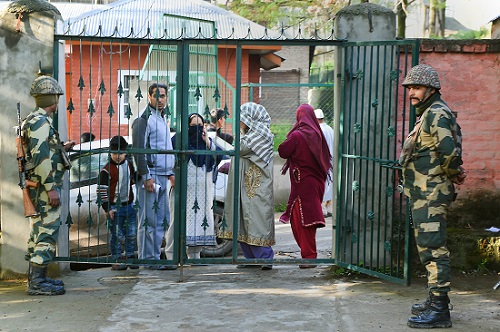
A few days ago the media in Kashmir carried a small election related news item about how voting at a polling booth in Srinagar was temporarily disrupted since the presiding officer had suffered a heart attack while voting was in progress. The positive part of this news is that the present condition of the officer named Zuhaib Bazaz who is being treated in SHMS Hospital is stated to be stable. Timely medical assistance is the key to survival in cases where a person suffers a heart attack and there is no doubt that it was because of prompt intervention that this incident ended on a happy note. But what’s intriguing is that the prompt action taken by a “first responder” that played a crucial role in saving Bazaz has gone largely unnoticed as the local media hasn’t mentioned anything about this.
Though Bazaz unfortunately suffered a heart attack inside the polling booth, he was still quite lucky because amongst the CRPF (Central Reserve Police Force) jawans deployed for polling booth’s security was a constable named Surinder Kumar who is one of the 50 CRPF soldiers trained by the Red Cross Society for the role of “first responder” during critical medical emergencies. On noticing that the presiding officer was feeling unwell, Constable Kumar immediately administered first aid. But when the patient fell unconscious, the CRPF jawan realised that Bazaz had most probably suffered a heart attack and he knew that lack of immediate medical assistance could endanger the life of the patient.
Realising the criticality of the situation, Kumar made frantic calls to medical emergency helplines but when no assistance was forthcoming, he took the wise decision of contacting his battalion doctor Dr Suneed Khan. What followed thereafter was reminiscent of a Hollywood thriller, while Dr Khan passed detailed instructions over the mobile phone on what to do to revive the patient, Kumar meticulously followed the instructions by performing emergency procedures directed by the doctor. For the next 45 minutes, Kumar gave Bazaz 30 compressions and three mouth-to-mouth respiration due to which the condition of the patient stabilised.
Meanwhile, Dr Khan contacted SMHS Hospital and with the help of DC (Divisional Commissioner) Srinagar arranged for an ambulance to evacuate Bazaz for specialised medical treatment. Doctors at the SMHS Hospital have attributed the patient’s near complete recovery to timely medical intervention and appreciated Constable Surinder Kumar for all his efforts. Remember, he was part of a CRPF detachment that was responsible for ensuring security of the polling booth against an external threat only. Accordingly, Kumar could have easily avoided taking the trouble of getting personally involved in resuscitating Bazaz since this wasn’t part of his mandate.
Those in uniform only know too well how security force personnel serving in Kashmir are often being demonised by some organisations and groups with vested interests. Accordingly, Kumar’s decision to go beyond his brief and administer first aid as also to perform emergency medical procedures to save the life of a person who had suffered a heart attack had its own associated dangers because anything could have gone wrong. Had the patient not responded, it is almost certain that Kumar would have been accused of having done something wrong due to which Bazaz’s medical condition had deteriorated and there are very bright chances that the ‘conspiracy’ angle behind the death would have also cropped up!
This brings us to the question as to why Constable Surinder Kumar, who had only undergone basic training as a ‘first responder’ and also knew the inherent risks of attending to a person who had just suffered a heart attack, still volunteer to do so? From the materialistic point of view, there may not be any precise answer that can satisfactorily explain this action, but we may find a suitable explanation if we view this incident from the human angle.
Despite materialistic considerations dominating all spheres of our activity today, there are still some occasions when conscience overrides worldly concerns and motivates a person to act with compassion. I wouldn’t like to speculate why the local media hasn’t mentioned anything about Kumar’s role in saving Bazaz but it would be very unfortunate if this is only because publicising the role of a ‘Good Samaritan’ played by a CRPF jawan may expose the motivated agenda of demonising security forces in Kashmir. Spelling out the reasons may be immaterial but by failing to articulate this truly inspirational story the fourth estate in Kashmir has missed a wonderful opportunity to spread the much needed message of how just a simple thing like ‘being human’ can make all the difference between life and death!
